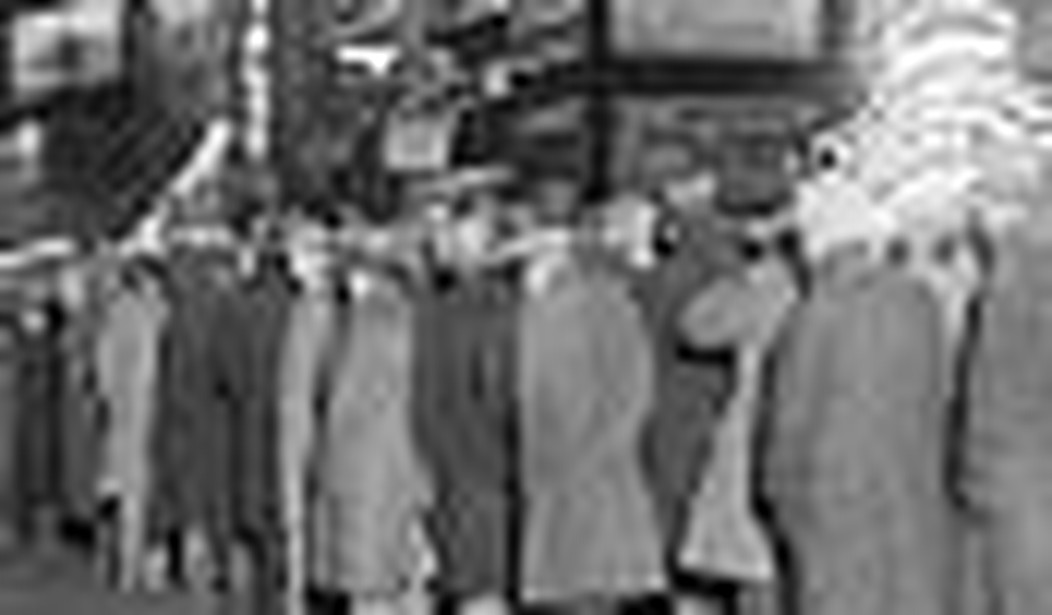Nearly everyone has heard the plaintive tune “Brother, Can You Spare a Dime?” Until recently, the song seemed to be a relic of a Great Depression long gone, when everything was in black and white rather than color, the breadlines stretched around city blocks, and a dime could actually buy something worth having. But ever since the cascade of events last summer and fall that led to our current worldwide recession, the song doesn’t seem quite so quaint anymore. Could our grandparents’ and great-grandparents’ plight become ours?
The lyrics are poignant and moving, but they highlight the differences rather than the similarities between then and now. And those differences are not limited to the obvious fact that these days the question would be asked by Congress and large financial institutions. Nor are they limited to the fact that today the request would be for a few trillion dollars of their taxpayer “brothers” rather than a thin dime.
The music for “Brother, Can You Spare a Dime?” (based on a Russian lullaby) was composed by Jay Gorney, while the lyrics were written by Yip Harburg, who was later responsible for all the lyrics to the songs in The Wizard of Oz and the Broadway show Finian’s Rainbow. “Brother, Can You Spare a Dime?” became popular shortly before Roosevelt was inaugurated, when unemployment climbed close to the 25 percent mark.
So the main concerns of the protagonist in this song are jobs and food; the basics of life. There is no mention of the stock market crash of ‘29, or the failure of large corporations or banks, although these events had certainly already occurred. The focus is squarely on the individual worker of a particular type: the laborer. This corresponds to the reality of the Great Depression, during which job losses fell disproportionately on men rather than women, and on those in the manufacturing and building industries (mines, steel, autos, construction, agriculture, and railroads in particular) rather than in service, sales, or the professional spheres.
The labor force is a segment of our economy that has for some time now been much smaller than it was before and during the Depression. But it is the segment that strongly predominates in the photographs of city breadlines of the era, full of men wearing the caps that were the badge of the laborer. These breadlines were run by private charities; there was no government dole at the time. There was also no unemployment insurance and no Social Security; in fact, there was no tradition of government help at all, no public safety net, and no expectation of it. There were neither entitlement programs nor a sense of automatic entitlement. The idea was that an individual ought to be able to fend for himself through labor. The changes in attitude from then to now are profound, and they are partly a result of the suffering experienced during the Great Depression and of the New Deal that attempted to combat it.
The protagonist in the song is a proud person who has been reduced through force of circumstance to begging from strangers. He counters his resultant sense of shame by using action verbs as he describes what he has accomplished in his life: building towers and railroads, plowing the earth, and soldiering.
Harburg, who was a socialist in his youth and was still a man of the Left, began the song by setting up a shadowy “they” who had betrayed a pledge made to the protagonist. What was that promise? Not a handout, but rather the American dream itself: the idea of an orderly meritocracy in which hard work would be rewarded, and where there would be enough to go around to provide at least the basics for all who were willing to sweat to earn them.
They used to tell me I was building a dream …
The lyrics describe the promises made of “peace and glory ahead” by a “they” never identified. Is it the government? The rich? The founding fathers? Employers? Did “they” intentionally lie and deceive, or was the whole thing an unfortunate accident?
We never learn. But it is clear that the speaker feels betrayed by someone or something, and questions why this has happened to him after all his hard work:
Why should I be standing in line/Just waiting for bread?
The listener is also meant to question it. It was during the Great Depression, and especially during the New Deal that followed the situation described in the song, that many Americans began to answer with the idea that — whatever the original cause of the hardship — rugged individualism was no longer enough. They thought that government must step in to rescue people from what were seen as the worst excesses of capitalism.
Even then, the programs of the New Deal that focused on the problems of the worker were not designed to simply give people money for nothing. They were geared toward providing government jobs, with a special focus on building the infrastructure that had been neglected for years. In the song, however, the New Deal has yet to occur, and the protagonist addresses the individual listener rather than government. The request — a dime — is clearly inadequate, especially because it is apparent that most people are strapped for funds themselves and would find it hard to “spare” one. Another message is one of personal closeness rather than distance — that people were all in this thing together in a society of relationships, emphasized by the protagonist addressing the listener not as “sir” “or “mister” but as “brother” and “buddy.”
The protagonist doesn’t want all that much. His needs are modest compared with ours today. He doesn’t live in a McMansion purchased with a subprime mortgage he couldn’t afford. In fact, it’s likely that he’s never owned a home at all. Even before the Depression led to many foreclosures, home ownership rates had remained below the 50% mark until a post-WWII housing boom caused rates to begin to rise steeply, reaching a high of nearly 70% in recent years.
The singer wants work, and he wants food. Our plight could change over time to resemble his more closely — especially if unemployment rises more than it already has — but so far, much of the angst regarding the current recession seems different. It concerns the destruction of the perception of wealth, especially future wealth, and a new fear of the practice of living on credit, which allowed so many people to spend so much more money than they earned. Nowadays, the lyrics would be more likely to say, They used to tell me I was building a 401(k).
Roosevelt was not above encouraging class warfare, even though he was born to wealth himself. In his first inaugural, for example, he blamed the fat cats in the financial sector:
Practices of the unscrupulous money changers stand indicted in the court of public opinion, rejected by the hearts and minds of men. … Faced by failure of credit they have proposed only the lending of more money. Stripped of the lure of profit by which to induce our people to follow their false leadership, they have resorted to exhortations, pleading tearfully for restored confidence. They know only the rules of a generation of self-seekers. They have no vision, and when there is no vision the people perish.
But that was all in the future when “Brother, Can You Spare a Dime?” was written. We can — and will — argue endlessly about whether the New Deal served mainly to alleviate or to prolong the Great Depression. But one thing is clear: although the welfare state goes unmentioned in the song, it was the government’s answer to the dilemma the song posed. And since then, there’s been little turning back.









Join the conversation as a VIP Member